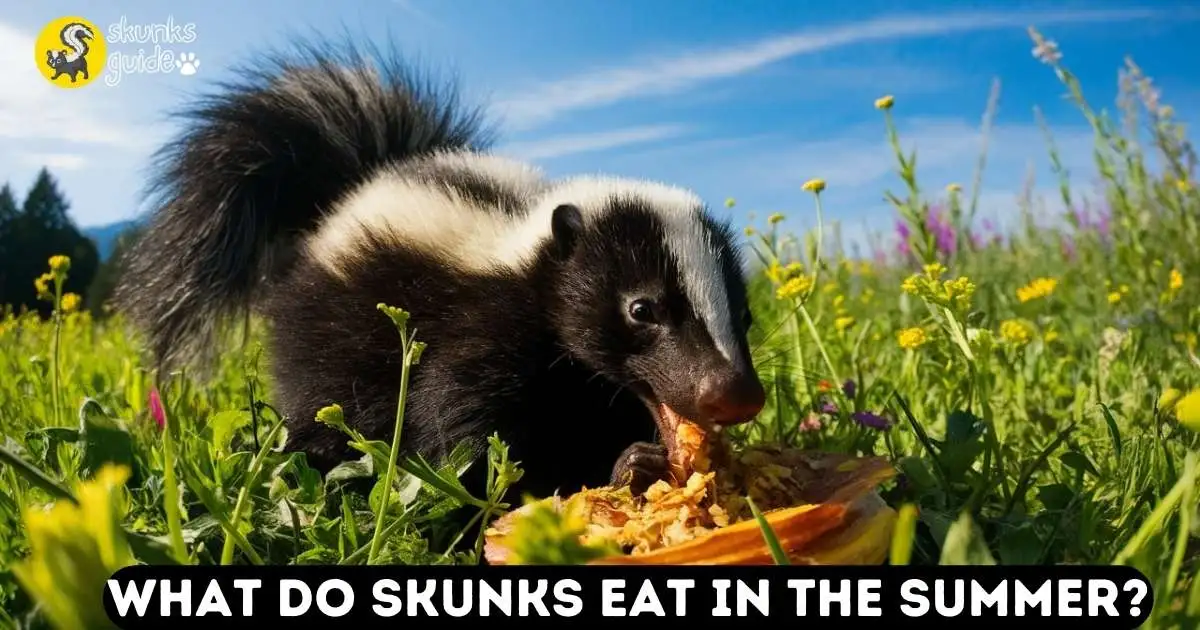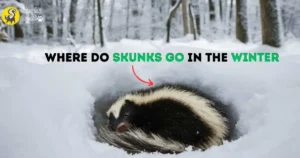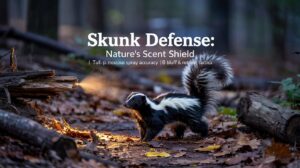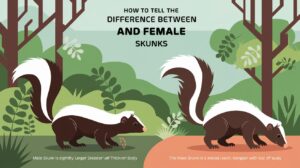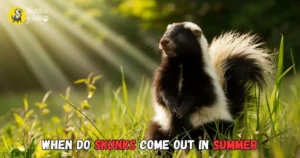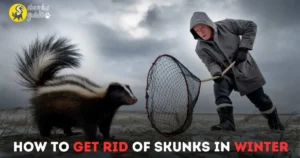What Do Skunks Eat in the Summer?
Skunks love munching on insects, fruits, and small animals during the warmer months. They’re also known for scavenging leftovers from human food sources, making them quite the opportunistic eaters. From my research on skunk behavior, I’ve discovered just how clever they are at finding food in the wild. Keep reading to find out more about what these curious creatures feast on when the weather heats up!
Introduction To Skunk Diet Patterns
Skunks have a varied diet that changes with the seasons. Understanding their eating habits helps us appreciate these unique animals. In summer, their food choices expand significantly.
Seasonal Shifts In Feeding
Skunks adapt their diet based on seasonal availability. In summer, they enjoy a wide range of foods.
- Fruits: Berries, apples, and melons are favorites.
- Insects: Grasshoppers, crickets, and beetles are plentiful.
- Small Animals: They may eat rodents or small birds.
- Vegetation: Skunks consume leaves, roots, and grains.
These food sources provide essential nutrients. Skunks help control insect populations by eating them.
Importance Of Understanding Skunk Diet
Knowing what skunks eat helps in several ways:
- Wildlife Management: Helps maintain healthy ecosystems.
- Garden Protection: Knowing their diet can protect gardens.
- Conservation Efforts: Supports habitat preservation for skunks.
Understanding skunk diets leads to better coexistence with these creatures. It helps in creating habitats that suit their needs.
| Food Type | Examples | Benefits |
|---|---|---|
| Fruits | Berries, apples, melons | High in vitamins and hydration |
| Insects | Grasshoppers, crickets | Protein-rich, controls pest populations |
| Small Animals | Rodents, small birds | Provides essential nutrients |
| Vegetation | Leaves, roots, grains | Fiber and minerals for digestion |
Skunks In The Wild
Skunks are fascinating creatures found in many regions. They thrive in various habitats. Understanding their diet helps us appreciate them more. In summer, their food choices change based on availability.
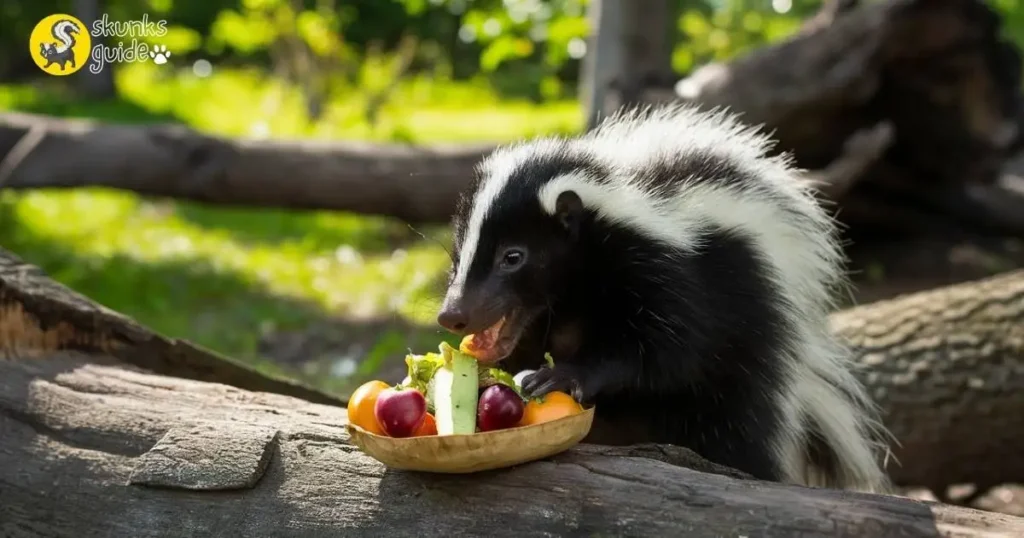
Habitat And Range
Skunks inhabit diverse environments. Here are some common habitats:
- Forests
- Grasslands
- Urban areas
- Farmlands
- Wetlands
They are mainly found in North America. Some species extend into Central America. Skunks prefer areas with easy access to food and shelter.
General Dietary Habits
Skunks are omnivores. They eat both plants and animals. Their diet varies with the seasons. In summer, skunks enjoy a wide range of foods.
| Food Type | Examples |
|---|---|
| Fruits | Raspberries, strawberries, and apples |
| Insects | Grasshoppers, beetles, and caterpillars |
| Small Animals | Mice, frogs, and small birds |
| Plants | Leaves, roots, and seeds |
Skunks use their keen sense of smell to find food. They dig for insects and roots. Fruits attract them during summer months. This diverse diet keeps skunks healthy and active.
Summer Bounty: Skunks’ Preferred Foods
In summer, skunks enjoy a diverse diet. Their food choices change with the seasons. They take advantage of the abundant summer bounty. Let’s explore their favorite foods during this time.
Fruits And Berries
Fruits and berries are a summer delight for skunks. They love to munch on:
- Strawberries
- Blackberries
- Blueberries
- Raspberries
- Grapes
These fruits provide vital nutrients. They also offer hydration during hot days. Skunks often forage in gardens and fields for these tasty treats.
Insects And Grubs
Insects and grubs are another favorite. Skunks are skilled diggers. They unearth various insects like:
- Beetles
- Grasshoppers
- Ants
- Worms
This protein-rich food helps skunks grow strong. Grubs are particularly abundant in summer. Skunks enjoy the hunt for these hidden treasures.
| Food Type | Examples | Benefits |
|---|---|---|
| Fruits | Strawberries, Blackberries | Hydration, Nutrients |
| Insects | Beetles, Grasshoppers | Protein, Energy |
Hunting Skills Of Skunks
Skunks are skilled hunters. They have unique abilities to find food. Their hunting skills help them thrive in summer. Let’s explore their foraging techniques and predatory behavior.
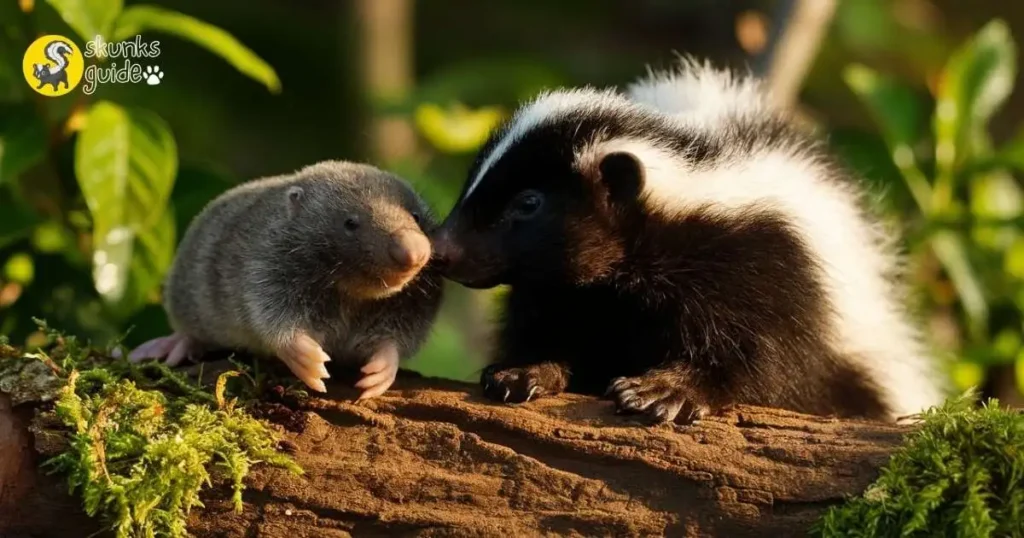
Foraging Techniques
Skunks use various foraging techniques to locate food. These techniques include:
- Smell: Skunks have a strong sense of smell.
- Digging: They dig in the ground for insects.
- Scavenging: Skunks look for leftovers from other animals.
- Night Activity: They often hunt at night.
These skills help skunks find food easily. They search for:
| Food Type | Example Items |
|---|---|
| Insects | Beetles, Grasshoppers |
| Fruits | Berries, Apples |
| Small Animals | Mice, Snakes |
| Plants | Roots, Tubers |
Predatory Behavior
Skunks also display interesting predatory behaviors. They are opportunistic feeders. This means they eat whatever is available. Their predatory behaviors include:
- Stalking: They quietly approach prey.
- Ambush: Skunks wait for the right moment.
- Chasing: They can run fast when needed.
Skunks prefer to hunt alone. They rely on stealth and surprise. This makes them effective hunters in their environment.
Plant Matter In Skunk Nutrition
Skunks enjoy a varied diet that includes plenty of plant matter. In summer, they seek out fresh greens and roots. This plant-based food provides essential nutrients. Let’s explore the types of vegetation and their nutritional benefits.
Vegetation And Roots
Skunks eat a variety of vegetation during summer. Their diet includes:
- Grasses
- Leaves
- Berries
- Roots
Skunks often dig for roots. They find tubers and other underground plants. These foods are rich in carbohydrates, giving skunks energy. Berries offer vitamins and hydration, making them a summer favorite.
Nutritional Value Of Plant Diet
The plant matter is important for skunk health. It provides vital nutrients:
| Nutrient | Benefit |
|---|---|
| Fiber | Aids in digestion and gut health |
| Vitamins | Boosts immune system and overall health |
| Minerals | Supports bone and muscle function |
| Water | Keeps skunks hydrated and healthy |
Skunks benefit from their plant-based diet. It supports growth and helps them thrive.
Interaction With Human Environments
Skunks often roam near human habitats in summer. They find food easily in these areas. Their diet expands due to the availability of waste and gardens. Understanding this interaction helps us manage skunk encounters.
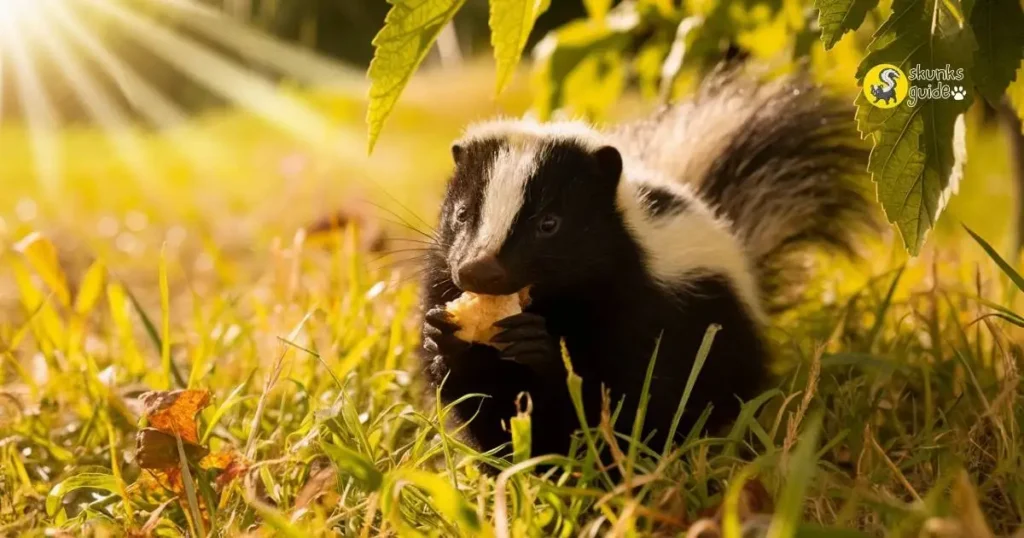
Scavenging Behavior
Skunks are known for their scavenging behavior. They search for food scraps in various places:
- Trash bins
- Picnic areas
- Backyards
- Street food stalls
Skunks have a strong sense of smell. They can detect food from a distance. This ability leads them to human environments. They consume leftovers and discarded items. Common finds include:
| Food Type | Examples |
|---|---|
| Fruits | Apples, berries, and melons |
| Vegetables | Tomatoes, corn, and peppers |
| Protein | Chicken bones, fish scraps, and pet food |
Impact Of Urban Feeding Opportunities
Urban areas offer abundant food sources for skunks. This leads to increased skunk populations. More skunks in neighborhoods can cause problems:
- Damage to gardens
- Rummaging through trash
- The potential spread of disease
Homeowners can help reduce skunk visits. Simple actions include:
- Secure trash bins with tight lids
- Remove pet food from the outdoors
- Clean up fallen fruits from trees
These steps minimize food availability. They can help keep skunks away from residential areas.
The Role Of Water Sources
Water sources play a vital role in a skunk’s summer diet. They help skunks stay hydrated and provide food options. Understanding these sources can reveal what skunks consume during the warm months.
Hydration Needs
Skunks need water for survival. They drink from various sources, including:
- Ponds
- Streams
- Birdbaths
- Pet water bowls
During summer, temperatures rise. Skunks require more water to stay cool. Proper hydration helps them hunt and forage effectively.
Water-dependent Food Sources
Many foods skunks eat depend on water sources. Here are some examples:
| Food Source | Water Dependency |
|---|---|
| Insects | High |
| Fruits | Moderate |
| Small mammals | Low |
| Vegetation | Moderate |
Insects, like beetles and crickets, thrive near water. These become easy targets for skunks. Fruits, such as berries, also grow near water. They provide a sweet treat during summer.
Small mammals are less water-dependent. Skunks will still hunt them if necessary. Vegetation, like grasses and roots, can be found near water too. Skunks eat these when other food is scarce.
Conclusion: The Skunk’s Summer Diet
The summer diet of skunks is fascinating and diverse. Skunks are omnivores, meaning they eat both plants and animals. In summer, their food choices expand significantly. This helps them thrive in warmer months.
Summary Of Dietary Insights
Skunks enjoy a variety of foods during summer. Here are the main components of their diet:
| Food Type | Description |
|---|---|
| Insects | Skunks love beetles, crickets, and grasshoppers. |
| Fruits | They eat berries, apples, and melons. |
| Vegetables | Skunks enjoy corn and other garden veggies. |
| Small Animals | They hunt mice, frogs, and small birds. |
| Eggs | Skunks often raid bird nests for eggs. |
Skunks play a vital role in controlling insect populations. Their eating habits help maintain ecological balance. They forage at night, searching for food. This nocturnal behavior helps them avoid predators.
Final Thoughts On Skunk Foraging
Understanding skunks’ summer diets can promote coexistence. Here are some key points to remember:
- Skunks are opportunistic feeders.
- They adapt their diet based on seasonal availability.
- Skunks contribute to pest control naturally.
- Providing a safe habitat supports their foraging.
Respecting skunks and their habits can benefit local ecosystems. Observing their foraging behaviors offers insight into their role in nature.
Conclusion
Understanding what skunks eat in summer helps us appreciate these unique creatures. Their diet varies, including fruits, insects, and small animals. By recognizing their eating habits, we can coexist peacefully. Protecting their natural habitat ensures they continue to thrive while keeping our environment balanced.

